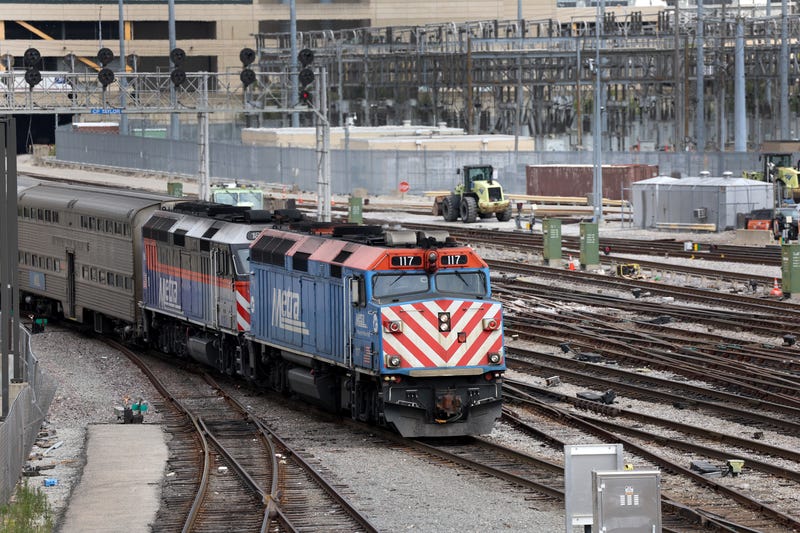
PHILADELPHIA (KYW Newsradio) — The U.S. is just a few days away from a potential railroad strike that would deliver a major blow to the economy.
If a deal is not reached between the major rail companies and each of the dozen unions that represent 115,000 workers, a strike would begin at 12:01 a.m. Friday, marking the end of a 60-day cooling period.
If there is a strike, trains would be unable to deliver goods like grains, coal, chemicals and cars. Supply chains, which have been trying to recover from the depths of the pandemic, would be snarled once again.
“You’re talking among the most vital activities within logistics and transportation by any measure — 30% to 40% of our goods are moved by rail,” said Abe Eshkenazi, CEO of the Association for Supply Chain Management.
“We’re already facing a number of shortages. We’ve got congestion at the ports, you’ve got trucking issues, we’ve got warehouse capacity issues.”
The Association of American Railroads estimates a strike would cost the economy $2 billion a day.
“We have made crystal clear to the interested parties the harm that American families, businesses and farmers and communities would experience if they were not to reach a resolution,” Karine Jean-Pierre, White House press secretary, said on Tuesday. “We are working with other modes of transportation, including the shippers and truckers, air freight to see how they can step in and keep goods moving in case of this rail shutdown.”
A Presidential Emergency Board was established in June to aid in the negotiations. The board’s recommendations, including 24% raises and $5,000 in bonuses, have been tentatively accepted by most of the unions involved. However, two unions representing engineers and conductors say they still have issues regarding quality of life, including a strict attendance policy with little flexibility to take time off.
If a strike occurs, some commuter rails would be affected in a few parts of the country, but significant disruptions are not expected in the Philadelphia area.
“We don’t run Regional Rail on any freight tracks,” said SEPTA spokesperson Andrew Busch. “Amtrak has told us that the Amtrak rail we use on the Trenton, Wilmington and Paoli lines will not be impacted.”
The strike negotiations do not involve Amtrak, but many Amtrak trains run on freight tracks. Amtrak said Wednesday it would begin phased adjustments to service outside the Northeast Corridor on tracks that freight companies own and operate, including cancellations of long-distance trains.
Amtrak said that most trains on the Northeast Corridor including Philadelphia would not be affected, with a few Northeast Regional departures affected. They said they would reach out to individual customers on those trains, offer reservation changes, waive fare differences for departures through September and October, and offer full refunds without cancellation fees.
NJ Transit says it does not anticipate any issues.
“We have been working closely with Conrail and have assurances that they will have mitigation measures in place at the appropriate areas on the Raritan Valley Line and the Atlantic City Rail Line to ensure there are no impacts,” the agency said in a statement.
You can read the full statement from Amtrak about its service in the midst of a potential freight rail strike below.
Amtrak is closely monitoring the ongoing freight rail – rail labor contract negotiations. The negotiations do not involve Amtrak or the Amtrak workforce. While we are hopeful that parties will reach a resolution, Amtrak has now begun phased adjustments to our service in preparation for a possible freight rail service interruption later this week. Such an interruption could significantly impact intercity passenger rail service, as Amtrak operates almost all of our 21,000 route miles outside the Northeast Corridor (NEC) on track owned, maintained, and dispatched by freight railroads. These initial adjustments include canceling all Long Distance trains and could be followed by impacts to most State-Supported routes. These adjustments are necessary to ensure trains can reach their terminals before freight railroad service interruption if a resolution in negotiations is not reached.
Most travel within the Amtrak-owned Northeast Corridor (Boston - New York - Washington) and related branch lines to Albany, NY, Harrisburg, PA, and Springfield, MA would not be affected: Acela would operate a full schedule, and only a small number of Northeast Regional departures would be impacted. Amtrak will reach out to impacted and potentially impacted customers, informing them of the potential situation, offering to change their reservation to another travel date, waiving any difference in fare for departures through October 31, or receiving a full refund without cancelation fees.
Customer Impact:
Amtrak will only operate trains this week that we can ensure will have enough time to reach their final destinations by 12:01 a.m. on Friday, Sept. 16.
Suspended services starting Tuesday, Sept. 13:
Southwest Chief
Empire Builder
California Zephyr
Train #421 portion of the Texas Eagle
Suspended services starting Wednesday, Sept. 14:
City of New Orleans
Coast Starlight
Crescent
Lake Shore Limited
Silver Star
Sunset Limited
Texas Eagle
Suspended services starting Thursday, Sept. 15:
Auto Train
Capitol Limited
Cardinal
Palmetto (south of Washington)
Amtrak will notify additional customers scheduled to be on upcoming trains about the possibility of disruptions.


